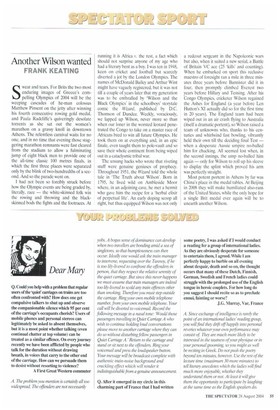Q. Could you help with a problem that regular users
of the 'quiet' carriages on trains are too often confronted with? How does one get compulsive talkers to shut up and observe the companionable silence which 95 per cent of the carriage's occupants cherish? Users of mobile phones and personal stereos can legitimately be asked to absent themselves. but it is a moot point whether talking (even continual chatter at top volume) can be treated as a similar offence. On every journey recently we have been afflicted by people who talk for the duration without drawing breath, in voices that carry to the other end of the carriage. How can we persuade them to desist without resorting to violence?
A First Great Western commuter A. The problem you mention is certainly all too widespread. The offenders are not necessarily yobs. A bogus sense of dominance can develop when two travellers are bonding amid a sea of singletons, so that bumptiousness can then occur. Ideally one would ask the train manager to intervene, requesting over the Tannoy, if he is too lily-livered to confront the offenders in person, that they respect the relative serenity of the quiet carriage. But since this never happens we must assume that train managers are indeed too lily-livered to scold any train offences other than smoking. Therefore you must step outside the carriage. Ring your own mobile telephone number, from your own mobile telephone. Your call will be diverted to voicemail. Record the following message in a nasal tone: 'Would those passengers travelling in Quiet Carriage A who wish to continue holding loud conversations please move to another carriage where they can do so without disturbing fellow passengers in Quiet Carriage A.' Return to the carriage and stand or sit next to the offenders. Ring your voicemail and press the loudspeaker button. Your message will be broadcast complete with authentic train-noise background and crackling effect which will render it indistinguishable from a genuine announcement.


























































 Previous page
Previous page